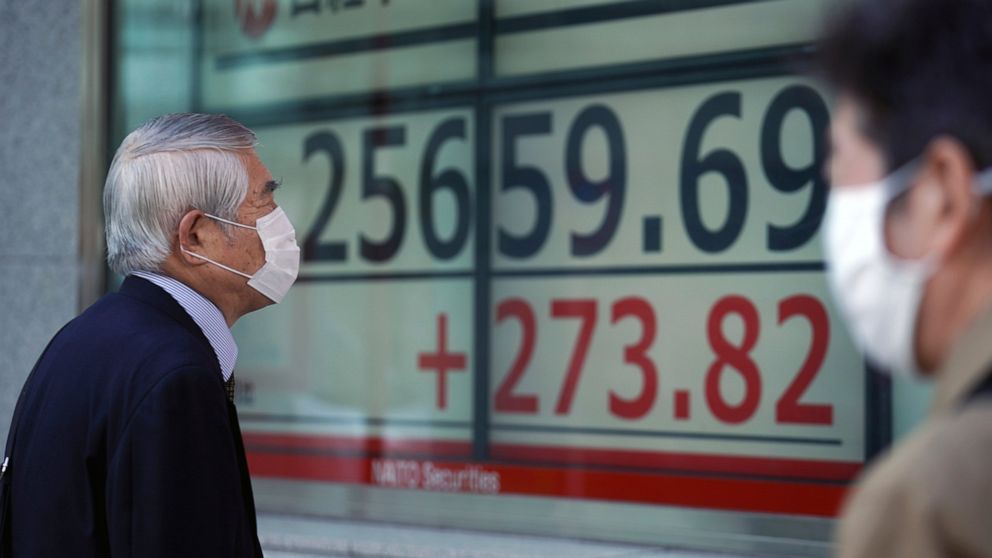S&P 500 adds to record, Dow heads for own on vaccine hopes
NEW YORK — Stocks are rising Monday, with the S&P 500 adding more to its record high and the Dow Jones Industrial Average on track to erase the last of its pandemic losses, following another round of encouraging data on a possible coronavirus vaccine.
Moderna said early in the morning that its COVID-19 vaccine appears to be 94.5% effective, according to preliminary data. It’s the second time this month that a company unveiled such encouraging numbers about a vaccine, boosting hopes that the global economy can return to some semblance of normal next year.
Leading the way again were stocks of companies that would benefit most from an economy busting out of its forced coma, such as airlines, movie theaters and banks. At the same time, pandemic-winning stocks that benefited from lockdown orders like Amazon and Zoom Video Communications lagged as they no longer looked like the only safe bets to play.
The S&P 500 was 0.7% higher in afternoon trading and adding to its all-time high set on Friday. The Dow Jones Industrial Average was up 355 points, or 1.2%, at 29,835, as of 2:10 p.m. Eastern time, and on pace to surpass its record of 29,551.42 set in February before pandemic panic hit the market. The Nasdaq composite was 0.4% higher, lagging the rest of the market amid lessened interest for tech stocks.
Treasury yields, oil prices and stocks around the world also rallied on the shot of increased optimism. A vaccine is precisely what markets have been waiting for to pull the global economy out of its cavern, and analysts say it’s a game changer.
Of course, for all its euphoria, many risks remain for the market. It’s still not guaranteed when a vaccine could be widely available, let alone whether one ultimately will. The pandemic is continuing to worsen, meanwhile, with rising coronavirus counts across the United States and Europe pushing governments to bring back varying degrees of restrictions on businesses.
“The vaccine could help people breathe a sigh of relief, but the devil is in the details,” said Gene Goldman, chief investment officer at Cetera Financial Group, referring to the need for more complete data and a eventual distribution plans.
But investors for now are focusing on the possibility of a world next year where customers are again going outside to work at offices, buying things at enclosed stores and heading on vacations.
It was just a week ago that Pfizer sent optimism soaring with its encouraging vaccine data results. Movie-theater chain Cinemark has soared nearly 58% since just before the announcement. Stocks of smaller companies, whose prices tend to sway more with the strength of the economy, are up more than double their larger rivals over the same time: a 7.7% jump for the Russell 2000 index of small-cap stocks versus 3% for the S&P 500.
Stocks of companies that had thrived amid lockdowns and vigilance about the virus, meanwhile, have lagged. Amazon, Netflix and Etsy are all down more than 5% since just before Pfizer’s announcement. Zoom has sunk 22%.
The shift in market sentiment is perhaps most clear in the stock prices of Peloton, with its at-home exercise bikes, and the Planet Fitness chain of gyms. Peloton is down nearly 20% since Nov. 6, versus a gain of more than 6% for Planet Fitness.
Investors aren’t abandoning Big Tech amid the vaccine hopes. But the ability of Apple, Microsoft and other behemoths to stand so clearly apart from the rest of the market has diminished a bit. That has many money managers looking at pulling some of the big profits made on Big Tech and plowing them into beaten-down areas of the market.
Of course, such movements could limit the gains for broad index funds. Stocks with bigger market values hold bigger sway on the S&P 500 and other indexes, which means the anticipated slowdown for Big Tech could restrain movements for the funds that have increasingly become the default investment for many 401(k) accounts.
“That’s sometimes what happens when you get a rotation, especially into the smaller stocks,” said Barry James, portfolio manager with James Investment Research. “You don’t see it. It’s almost invisible.”
Even before Moderna’s vaccine news, markets had been trading higher as investors welcomed the signing on Sunday of an agreement establishing the world’s biggest trade bloc, a group of 15 countries that includes China, Japan, South Korea, 10 countries in Southeast Asia, New Zealand and Australia. The United States, the No. 1 economy, is not a part of it.
Called the Regional Comprehensive Economic Partnership, the pact mostly will bring already low tariffs lower over a 20-year period. It is expected to have a positive but incremental impact on trade in the region.
In Asian stock markets, Japan’s Nikkei 225 rose 2.1%, South Korea’s Kospi gained 2% and Hong Kong’s Hang Seng added 0.9%. Stocks in Shanghai climbed 1.1%.
In Europe, France’s CAC 40 jumped 1.7%, and Germany’s DAX returned 0.5%. The FTSE 100 in London gained 1.7%.
Benchmark U.S. crude oil climbed 3% to settle at $41.34 per barrel amid hopes that a healthier economy would burn more fuel. Brent crude, the international standard, rose 2.4% to settle at $43.82 per barrel.
The yield on the 10-year Treasury rose to 0.90% from 0.87% late Friday.
———
AP Business Writers Elaine Kurtenbach, Joe McDonald and Yuri Kageyama contributed.
![]()


